Edie Melson's Blog, page 91
April 25, 2023
The Writer’s Adventure of Using Sensory Perception Part 2
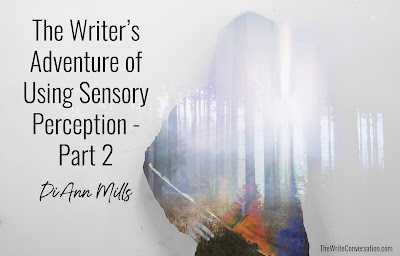
by DiAnn Mills @DiAnnMills
Sensory perception sends an invitation for the reader to, “Come join my story adventure!” The writer uses action, dialogue, and figurative language—metaphors and similes—to show seeing, hearing, tasting, smelling, touch, and even intuition for the reader to identify with the character. The reader’s expectations are met by associating specific language and memory to invoke emotion. Experiencing the scene through the senses pulls in the energy of credibility, but only if the writer uses relational and understandable language that emerges from the real inner character.
Last month, we dived into sight, sound, and smell. Let’s continue!
TouchTouch invites intimacy more than any of the other senses.
Young children want to touch everything. They determine characteristics about the external world according to how their brains translate pleasant, painful, or non-exciting stimulation.
Texture is important not only to children but adults. Do you have a favorite pair of jeans? A soft T-shirt? What about a scratchy sweater?
The touch of someone we love is soothing, comforting, and a sensation we look forward to. But if that person or another physically hurts us, our memories store the information for the future.
Consider the parent who disciplines a child with a time-out. When the parent retrieves the child to talk about the inappropriate behavior and to reinforce his/her love, he/she touches the child, both emotionally and physically.
Another trait of touch is the distance between the character and who is touching them. We can be touched by a passionate speech in a room full of people or a one-on-one with the speaker, and we are touched verbally, mentally, physically, or a combination.
“A person can be stimulated by what they see, hear, taste, or smell, but when a person is touched, the sensation invites intimacy.” Rebecca McClanahan
TasteWe think of taste as sweet, sour, salty, bitter, spicy, and the list continues. As stated above, smell is linked to taste—apple pie, savory steak, freshly brewed coffee, bacon and eggs, and more. Memory also plays a vital role—Thanksgiving with roasted turkey, mashed potatoes, gravy, and cranberry sauce offers an emotional link to special events and holidays, especially when expectations are met with those we love. However, unpleasant memories . . . you get the picture.
Taste and its partner smell can usher in unpleasant memories. As a child, I attended a family reunion where hot dogs, corn-on-the-cob, and watermelon filled my plate. On the four-hour drive home, I got sick. To this day, I have difficulty smelling those foods and refuse to eat them. Another note is the fearful sensation (memory) that results when invited to a family reunion or picnic.
Imagine a feast of pizza for a team of high school football players before the big game. What usually stands for enthusiasm and a commitment to win can change drastically if the players fall ill to food poisoning. The smell of pizza can provoke a lingering repulsive memory.
Celebrations with exquisitely prepared food partners taste with memory and hope for the event to occur again.
Sixth SenseThe sixth sense is a perception beyond the basic five senses, one that can’t be seen, heard, smelled, touched, or tasted. The sensation is intuitive, a gut feeling without proof. Most of us have felt a sixth sense, and the strange sensation accompanying it. We’re not sure if the awareness is reliable, false, or a gift. Our characters experience the same undeniable perception.
Using sensory perception to enhance emotion helps our reader retain the story. The writer uses the proven methods to show and not tell the story. The scenes that incorporate these engine-additives often increase the likelihood of the reader purchasing our next book and the next.
How are you using touch, taste, and the sixth sense in your writing?
TWEETABLEThe Writer's Adventure of Using Sensory Perception Part 2 from author @DiAnnMills on @EdieMelson (Click to Tweet)
Don't Miss the Other Post in this Series! Part 1, The Writer's Adventure of Using Sensory Perception Part 2, The Writer's Adventure of Using Sensory Perception
 DiAnn Mills is a bestselling author who believes her readers should expect an adventure. She creates action-packed, suspense-filled novels to thrill readers. Her titles have appeared on the CBA and ECPA bestseller lists; won two Christy Awards; and been finalists for the RITA, Daphne Du Maurier, Inspirational Readers’ Choice, and Carol award contests.
DiAnn Mills is a bestselling author who believes her readers should expect an adventure. She creates action-packed, suspense-filled novels to thrill readers. Her titles have appeared on the CBA and ECPA bestseller lists; won two Christy Awards; and been finalists for the RITA, Daphne Du Maurier, Inspirational Readers’ Choice, and Carol award contests. She is the former director of the Blue Ridge Mountain Christian Writers Conference, Mountainside Marketing Retreat, and Mountainside Novelist Retreat with social media specialist Edie Melson. Connect here: DiAnnMills.com
Published on April 25, 2023 22:00
April 24, 2023
Are You a Skilled Enough Writer to Put Your Readers to Sleep?
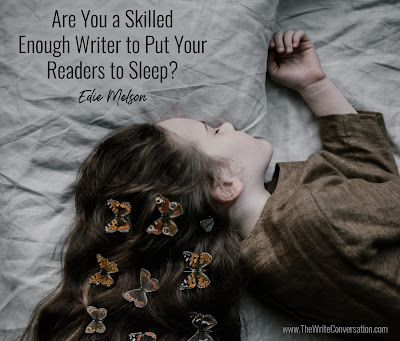
by Edie Melson @EdieMelson
Nope the title isn't a typo. You read it right. I'm suggesting skilled writers should put their readers to sleep.
Okay, maybe not completely to sleep, but at least allow them to dream. What does dreaming have to do with writing? Everything. The dream I’m referring to is the fictional dream. If you’ve never heard the term before, don’t worry. I guarantee you know what I’m talking about. I think author, John Gardner says it best.
“What counts in conventional fiction must be the vividness and continuity of the fictional dream the words set off in the reader’s mind.” -John Gardner
A fictional dream occurs when the world in the story you’re reading becomes more real than the physical world around you. We’ve all be there at one time or another—transported into another time or another place by an author’s well crafted words.
This experience is one that we try to create for our readers. And it’s one of the biggest differences between a good book and a great one. So how do we create this dream world? We do it by paying attention. Notice where you are right now. Are there sounds? Smells? Even if you’re not overwhelmed by your setting I bet you’re aware of it. The same thing is true for our characters. If we've written them as three dimensional people then they should notice and be affected by what's around them. However, if we neglect those details, we deny our readers the chance to be transported.
Even more important than what we do to put our readers to sleep is what we DON’T do. I think writers are far more often guilty of waking a reader up. We, as the author, have an obligation to not jolt our readers out of their fictional dream world. And each of us must become a skilled enough writer to put your readers to sleep!
Some Things that Interrupt Fictional DreamsBad Grammar—I’m not talking about a missed comma or two. I’m referring to sentence structure that’s difficult to read, modifiers that modify the wrong thing or even complicated punctuation. All of these things can cause a reader to stop and ponder what you’re trying to say. Once they stop you’ve lost them, they’re awake.Confusing Dialogue—This can include things like long sections of dialogue with no speaker tags or beats. If the reader has to go back and figure out who’s speaking it means you’ve either not put in enough tags or your characters don’t have unique enough voices to be identified. One word of caution, overuse of ‘said’ instead of interspersing with speaker beats can be just as jarring.Creative Speaker Tags—Anytime you use a speaker tag other than said or maybe asked you run the risk of making your reader stop. The word said is so common place in literature that it’s almost invisible. The reader skims lightly over it, uninterrupted. If, on the other hand, you pull out your thesaurus and try to find other words to use in its place you end up with jarring prose that tells the story through speaker tags instead of dialogue.Characters who don’t act right—I’m not referring to moral actions. We’ve all read stories where a character does something and we find ourselves shaking our heads. Know your characters well enough to keep them from acting out of character.Overwriting a dialect—I’m not against allowing your character to speak with an accent or in a dialect, but be careful how you do it. When the character is first introduced you can use a heavier hand with the spellings that denote dialect, such as learnin’ instead of learning. But after the reader gets to know the character they can hear the character speaking in their head and you don’t have to use spelling to convey their voice. In fact, if the reader has to work too hard to decipher your intent they will never even make it into the fictional dream.Head Hopping—This is when you switch POV (point of view) from one character to another without a good reason. The rule of thumb is that each scene should have a single POV character and that should be the character with the most at stake.
The storyteller who can invite the reader into his world and make him believe it's real has captured the essence of what it means to be a great writer.
Now it's your turn. Have you ever read a book where you were jolted out of your fictional dream? What about one where you were transported to another world by an amazing author? Share your experiences and we'll compare notes!
And, don't forget to join the conversation!Blessings,Edie
TWEETABLEAre You a Skilled Enough Writer to Put Your Readers to Sleep? from author @EdieMelson (Click to Tweet)
 Edie Melson is a woman of faith with ink-stained fingers observing life through the lens of her camera. No matter whether she’s talking to writers, entrepreneurs, or readers, her first advice is always “Find your voice, live your story.” As an author, blogger, and speaker she’s encouraged and challenged audiences across the country and around the world. Her numerous books reflect her passion to help others develop the strength of their God-given gifts and apply them to their lives. Connect with her on her website, through Facebook, Twitter and Instagram.
Edie Melson is a woman of faith with ink-stained fingers observing life through the lens of her camera. No matter whether she’s talking to writers, entrepreneurs, or readers, her first advice is always “Find your voice, live your story.” As an author, blogger, and speaker she’s encouraged and challenged audiences across the country and around the world. Her numerous books reflect her passion to help others develop the strength of their God-given gifts and apply them to their lives. Connect with her on her website, through Facebook, Twitter and Instagram.Featured Image: Photo by Annie Spratt on Unsplash
Published on April 24, 2023 22:00
April 23, 2023
5 Best Tips to Help Writers Add Text to Images

by Ane Mulligan @AneMulligan
Let’s face it, pictures are worth ... well, a lot. There are many kinds of memes: funny ones, political ones, life commentaries, inspirational ones, and more. But for this post, I’m focusing on book and author promo.
I love to use memes to promote my books. I’ve learned a lot about them over the last few years.
My 5 Best tips for Making Memes
1. Software
You don’t have to have high-priced software. Canva is excellent, even in the free version. A few years ago, I found one I like. Swift Publisher 5 is a $20 program but it’s only for Macs. I love this program. It has layers, and neat things. The only problem with it is the user. I’m not so tech-savvy. However, I’ve managed some nifty banners we used in our Community Theatre with this program. There are free versions and paid versions of most software. There are other online resources as well as other software like Adobe photoshop. If you have a favorite, share it in the comments!
2. Free Photos
Be sure you use photos that are not copyrighted. Some resources are pixabay.com, pexels.com, morguefile.com. There are others. Be sure to check them carefully. I use Pixabay the most. Occasionally, I “buy a cup of coffee” or donate to the site for all the photos I use. I also upload some of my photos to Pixabay for others to use. If you’re a decent photographer, take your own pics. Be creative. Find an old window in a salvage shop and photograph it. Then slip your book inside that window.
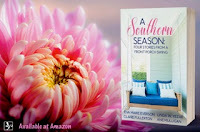 3. Speaking of be creative
3. Speaking of be creative Be creative with the composition and with the photos you choose. Not a great photographer? Welcome to my lens. BUT (and I always have a big but) I started paying attention to the composition of Edie Melson's photography. I studied hers and began to make mine better.
Think outside the box of convention. Eva Marie Everson caught me by surprise on this, when I was creating some memes for a book in which we did together. I made one for a Fall ad. She came back with a photo of a hot pink chrysanthemum. It suited the book cover’s coloring better than the typical fall colored photo I used at first. Even though it was pink, mums are fall flowers.
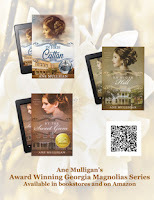 4. QR Codes
4. QR CodesYou want to have a link to the book you’re advertising. That said, most memes don’t allow embedded links, but now we have QR codes. I already told you I'm a technidufus. I wasn't raised in the computer era. We didn't text; we wrote letters. Anyway, when I did an ad for a playbill at our theatre, the uber-talented Jacquie Bosma told me about putting a QR Code in my ad meme. Then anyone can scan it with their phone camera, and bingo, they land on the book. My wonderful publisher (Iron Stream Media) made a page of all my books, so I was able to get a QR Code to that page. Plus, can make them in color at QR Code Generator. MEME 2
5. Be succinct.
Social media demands brevity. If they don’t see something of value to the in the first few seconds, people are on to the next post. The best memes have a great picture and few words. Especially if the meme is an advertisement. Don’t try to put your back-cover copy on the meme. I learned that when my first book came out. I was such a novice at memes. Well, I’ve done my homework, and now mine follow the old adage a picture is worth ... a bunch!
Now it’s your turn. What are your best tips for making memes?
TWEETABLE5 Best tips to Help Writers Add Text to Images from author @AneMulligan on @EdieMelson (Click to Tweet)
 Ane Mulligan lives life from a director’s chair, both in theatre and at her desk creating novels. Entranced with story by age three, at five, she saw PETER PAN onstage and was struck with a fever from which she never recovered—stage fever. One day, her passions collided, and an award-winning, bestselling novelist immerged. She believes chocolate and coffee are two of the four major food groups and lives in Sugar Hill, GA, with her artist husband and a rascally Rottweiler. Find Ane on her website, Amazon Author page, Facebook, Instagram,Pinterest, The Write Conversation, and Blue Ridge Mountains Christian Writers Conference Blog.
Ane Mulligan lives life from a director’s chair, both in theatre and at her desk creating novels. Entranced with story by age three, at five, she saw PETER PAN onstage and was struck with a fever from which she never recovered—stage fever. One day, her passions collided, and an award-winning, bestselling novelist immerged. She believes chocolate and coffee are two of the four major food groups and lives in Sugar Hill, GA, with her artist husband and a rascally Rottweiler. Find Ane on her website, Amazon Author page, Facebook, Instagram,Pinterest, The Write Conversation, and Blue Ridge Mountains Christian Writers Conference Blog.
Published on April 23, 2023 22:00
April 22, 2023
The Question Every Writer Needs to Answer for Themselves: Flying or Skydiving?
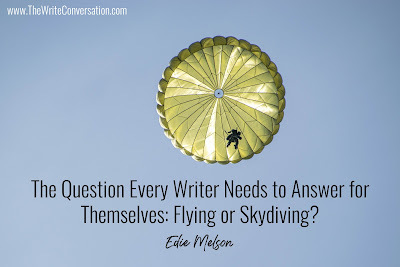
by Edie Melson @EdieMelson
Now to Him who is able to do far more abundantly beyond all that we ask or think, according to the power that works within us, Ephesians 3:20
Sometimes (more often than not) I get caught up in the process of life. I’m an analytical sort of person, and I’m definitely a planner. With every project I tackle, I make plans, trying to anticipate any possible potholes and pitfalls. I build timelines and set expectations.
I’m also a recovering perfectionist.
For years I didn’t realize I was a perfectionist, but I definitely am. My perfectionism shows itself in strange ways. In the past it has kept me from trying anything I thought I couldn’t succeed at. For me, failure wasn’t an option. That translated into a hurdle that kept me from pursuing my dreams.
Truthfully, that issue does continue to crop up from time to time. (I can anticipate the snickers this engenders in my family and close friends as they read this.)
In the past I’ve gone to great lengths to build in safeguards that keep failure at bay when I tackle a difficult project. I always thought of these things as packing a parachute. They’d be a built-in safety net that would keep me from crashing and burning if I hadn’t covered all the possibilities.
Then one day I felt a metaphoric tap on the shoulder from the Holy Spirit. He asked me a question I’ve never forgotten.
Are you skydiving or flying?
You see God is in the business of helping us to fly. He’s not interested in skydiving, and He has no need of parachutes. Sure there are things we need to do to get ready to fly, but packing a parachute isn’t one of them. God wants us to fly free, chasing the dreams He's set into our hearts. His plan doesn't include the encumbrances of safety nets and parachute. When He's in control, they're just extra baggage that can hold us tethered to the ground.
So whatever dream you’re chasing, leave the parachute home and get ready to fly.
TWEETABLEThe Question Every Writer Needs to Answer for Themselves: Flying or Skydiving, from @EdieMelson (Click to Tweet)
 Edie Melson is a woman of faith with ink-stained fingers observing life through her camera lens. She’s a writer who feels lost without that device & an unexpected speaker who loves to encourage an audience. She also embraces the ultimate contradiction of being an organized creative. She knows the necessity of Soul Care and leads retreats, conferences & workshops around the world on staying connected to God. Her numerous books, including the award-winning Soul Careseries & reflect her passion to help others develop the strength of their God-given gifts. Her blog, The Write Conversation is recognized as one of the top 101 industry resources.
Edie Melson is a woman of faith with ink-stained fingers observing life through her camera lens. She’s a writer who feels lost without that device & an unexpected speaker who loves to encourage an audience. She also embraces the ultimate contradiction of being an organized creative. She knows the necessity of Soul Care and leads retreats, conferences & workshops around the world on staying connected to God. Her numerous books, including the award-winning Soul Careseries & reflect her passion to help others develop the strength of their God-given gifts. Her blog, The Write Conversation is recognized as one of the top 101 industry resources. She and husband Kirk have been married 40+ years and raised three sons. They live in the foothills of the Blue Ridge Mountains and can often be found hiking—with Edie clinging to the edge of a precipice for the perfect camera angle and Kirk patiently carrying her camera bag and tripod. Connect with her on her website, www.EdieMelson.com and through social media.
Published on April 22, 2023 22:00
April 21, 2023
Two Types of Writers for Such a Time as This

by Zena Dell Lowe @ZenaDellLowe
I’m convinced that there are primarily two types of Christian writers out there. Type one is the perfectionist (you know who you are). This is the person who needs to get it so right that they rarely complete a project. They work hard, laboring over the minutest details, rewriting various sections and constantly making little tweaks and improvements, but their work is seldom excellent, because good enough just isn’t good enough.
And then there's type two (you know who you are). This is the person who turns out project after project, preferring speed and quantity to perfection. They work hard, constantly churning out words and sorting through the myriad of new ideas that bombard their brain each day, but their work is seldom excellent, because good enough is good enough.
There are two types of writers in the Christian community, and I have a message for you both.
TYPE 2 – We Can Do Better
Let's start with the second type, the one who thinks that good enough is good enough. This is the person who settles for mediocrity and doesn't bother critiquing or editing their work. They're too anxious to get the project done and into the hands of somebody important to take the time to bother with corrections. These writers would never waste their time slaving over a project line by line, sentence by sentence, or word by word. They're convinced that whatever they've written is sufficient, or, if something does need to be rewritten, they’ll simply start that section from scratch rather than go through the pangs of a rewrite.
These writers have their strengths, to be sure. But here's what I have to say to you: Do better. We live in a day and age when it’s not enough to be good enough. We must be better. When you’re sloppy or careless, you make a mockery of us. When you turn in stuff that has spelling errors and mistakes in grammar or is simply not well written, you collectively harm us all. The fact is, it’s a wonderful gift and calling to be a writer. And it’s disrespectful to not be excellent in your craft. It's disrespectful to your Creator, who is the author of creativity. And it's disrespectful to anybody you put upon to read your subpar work. Do better.
I'm at the point now where I get angry when I see multiple, silly mistakes. Spelling errors and inaccuracies in grammar and punctuation are simply unacceptable. When I find those things, I get angry, because it tells me you’re willing to waste my time. You’re a selfish person who thinks you’re more important than I am. And you’re lazy, not even willing to do the work. That person has not prepared their work adequately to justify the time and the energy that I'm supposed to put in their story. If they didn't take the time to make it as good as it possibly could be for me to read, then why should I take the time to read it. It's disrespectful to me. It's disrespectful to your reader and it's disrespectful to God. But it's also disrespectful to yourself.
In my experience, these types of people (and if you're one of them I say this with love and affection), do not seem to be open to feedback. There seems to be a fair amount of obtuseness or denial in them, because they often think their stuff is brilliant. Some of them have even been published, but they’re still churning out subpar art. We can do better. We must do better. It is our duty to make our work as excellent as we possibly can.
That doesn't mean that everybody is going to be on par with CS Lewis or JR Tolkien. I once saw an episode of Oprah where Amy Grant performed just after Mariah Carey, who can sing three and a half octaves (which she demonstrated on the show). So, after performing, both artists were being interviewed, except Oprah was fawning all over Mariah Carey as if poor Amy Grant didn’t even exist. And then Oprah seemed to realize that Amy Grant was still there, and she turned to her and asked some question about Amy Grant’s music. And Amy Grant smiled and graciously replied, “Well, I just take my two octaves and I do the best I can.” And that’s what we must do. But when we don't do our best with gifts God has given us, when we don’t fix or correct obvious things and we squander the gift of creativity, it’s lazy and disrespectful. It’s unacceptable. We. Can. Do. Better.
TYPE 1 – Get Over Yourself
Now, I turn to the other group of artists—those who never seem to be able to get anything done. You're amazed by people who complete projects in a timely fashion because you are so paralyzed by perfection. But I know the secret behind your paralysis: you're terrified of getting it wrong. You’ve become a slave to perfectionism. You are enslaved. You’re like a legalist seeking salvation through your own works.
Here's my message to you: Stop trying to manage the perceptions of others. Stop trying to control everything. Stop trying to be perfect, and trust God. Did He choose you by accident? Has He abandoned you to go it alone? No? Then what are you doing? Stop agonizing. Just write it.
Write it. You can perfect it later. Your job is to get it on the page. You owe it to yourself, to God, and to others. Don’t hide your light under a bushel. Get it out of you. Just write. And tell your inner critic to be silent because you have been given your story idea for a reason. God entrusted you with something precious. And yes, you already know that which is why you take what you're doing so seriously, but your paralysis is a form of egoism, and you’re squandering your gift. So, get over yourself. You cannot do anybody any good if you allow yourself to be paralyzed by perfection.
My practical advice to you is to stop editing your work as you go. Force yourself to keep moving forward. Don't even look back. Force yourself to write it out longhand if you must, whatever prevents you from going back to edit. And then, once you get that first draft down, then you can go back and see what needs to be fixed. But until then, your efforts only sabotage your progress.
So, learn something from those in the other camp, who manage to just get it all down. We should be learning from each other. We are entering some dark days in culture, and we were created for such a time as this. So, let us set aside both our perfectionism and our mediocrity, and let’s write some stories that have the power to change the world.
TWEETABLETwo Types of Writers for Such a Time as This, hard truth from @ZenaDellLowe on @EdieMelson (Click to Tweet)
 Zena has worked professionally in the entertainment industry for over 20 years as a writer, producer, director, actress, and story consultant. Zena also teaches advanced classes on writing all over the country. As a writer, Zena has won numerous awards for her work. She also has several feature film projects in development through her independent production company, Mission Ranch Films. In addition to her work as a filmmaker, Zena launched The Storyteller’s Mission with Zena Dell Lowe, a podcast designed to serve the whole artist, not just focus on craft. In 2021, Zena launched The Storyteller’s Mission Online Platform, where she offers advanced classes and other key services to writers. Zena loves story and loves to support storytellers. Her passion is to equip artists of all levels to achieve excellence at their craft, so that they will truly have everything they need to change the world for the better through story.
Zena has worked professionally in the entertainment industry for over 20 years as a writer, producer, director, actress, and story consultant. Zena also teaches advanced classes on writing all over the country. As a writer, Zena has won numerous awards for her work. She also has several feature film projects in development through her independent production company, Mission Ranch Films. In addition to her work as a filmmaker, Zena launched The Storyteller’s Mission with Zena Dell Lowe, a podcast designed to serve the whole artist, not just focus on craft. In 2021, Zena launched The Storyteller’s Mission Online Platform, where she offers advanced classes and other key services to writers. Zena loves story and loves to support storytellers. Her passion is to equip artists of all levels to achieve excellence at their craft, so that they will truly have everything they need to change the world for the better through story.To find out more about Zena or her current courses and projects, check out her websites at WWW.MISSIONRANCHFILMS.COM and WWW.THESTORYTELLERSMISSION.COM
Featured Image: Photo by Christina @ wocintechchat.com on Unsplash
Published on April 21, 2023 22:00
April 20, 2023
How to Become a Professional Writer
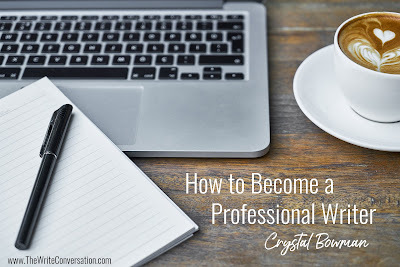
by Crystal Bowman
The Merriam-Webster dictionary defines professionalism as "the conduct, aims, or qualities that characterize or mark a profession or a professional person"; and it defines a profession as "a calling requiring specialized knowledge and often long and intensive academic preparation." Another (simpler) definition I found is: “relating to or belonging to a profession; engaged in a specified activity as one's main paid occupation rather than as an amateur.”
If you want to become a professional writer, the following steps may guide you to your destination:
#1. Prepare.Read books about writing and publishing.Attend writers’ conferences.Take courses on writing for publication and zero in on your desired genre. Learn everything you can about the writing and publishing process.
#2. Write something.Write a story, article, poem, blog, or devotion to share with an audience other than your best friend, family members, and dog (Christmas letters don’t count).Revise. Revise. Revise.Meet with a reputable critique group.Have your work edited by a professional editor or writing coach.
#3. Have your work published in one of the following:Magazine (print or online)Compilation bookDevotional bookNewspaper/newsletter/journalBook (indie published/co-published/traditionally published)Screen or stage playSong lyrics
#4. Grow your platform.Obtain ongoing opportunities for publication.Have a professional website. Establish social media platforms and email subscribers.Seek speaking opportunities.Network with other writers and people in the publishing industry.
And now for the BIG question: Can professional writers make a living by writing?If you are a minimalist living in a puptent on someone’s property, and if you grow your own vegetables and raise chickens, it is possible.If you write a bestselling series like Harry Potter and the books turn into movies and the brand produces merchandise that is sold all over the world, you can live off your royalties. If you want to own a home in a nice community and have money for living expenses and a few extra luxuries like a car, cell phone, and television, you may need another source of income.Reality check—there are approximately 50,000 professional writers in the US. About 500 writers consider it their full-time job.
My definition of a professional writer:Someone who believes God has called them to write and obeys that calling. Someone who is willing to learn everything they can about the world of writing and publishing.Someone who is patient, persistent, and tenacious as they wait for the right opportunity. Someone who bravely walks through the doors God opens for them. Someone who prays and asks God to bless and use the words they write.Someone who writes words that encourage, comfort, motivate, inspire, and touch the hearts of those who read them. Someone who realizes that God’s plan and purpose for their writing life will prevail.
One last thought:
To borrow a quote from Tom Hanks in the movie A League of Their Own (and changing the first few words): Being a professional writer is hard, but the hard part is what makes it good. If it were easy, everyone would do it.
TWEETABLEHow to Become a Professional Writer from author Crystal Bowman on @EdieMelson (Click to Tweet)
 Crystal Bowman is an award-winning, bestselling author of more than 100 books for children and four nonfiction books for women. She also writes lyrics for children’s piano music and is a monthly contributor to Clubhouse Jr. Magazine. She loves going to schools to teach kids about poetry. She also speaks at MOPS (Mothers of Preschoolers) groups and teaches workshops at writers’ conferences. When she is not writing or speaking, she enjoys going for walks, working out at the gym, and eating ice cream. She and her husband live in Michigan and have seven huggable grandkids.
Crystal Bowman is an award-winning, bestselling author of more than 100 books for children and four nonfiction books for women. She also writes lyrics for children’s piano music and is a monthly contributor to Clubhouse Jr. Magazine. She loves going to schools to teach kids about poetry. She also speaks at MOPS (Mothers of Preschoolers) groups and teaches workshops at writers’ conferences. When she is not writing or speaking, she enjoys going for walks, working out at the gym, and eating ice cream. She and her husband live in Michigan and have seven huggable grandkids. WWW.CRYSTALBOWMAN.COMWWW.FACEBOOK.COM/CRYSTAL.BOWMANWWW.FACEBOOK.COM/CRYSTALJBOWMANWWW.INSTAGRAM.COM/CRYSTALBOWMANAUTHOR
Published on April 20, 2023 22:00
April 19, 2023
Increase Revenue through an Email List Only Flash Sale
by Susan U. Neal RN, MBA, MHS @SusanNealYoga
Email marketing is more effective than social media marketing because by sending regular your readers come to know, trust, and favor you. If you want to increase your readership and revenue through email marketing, check out the first two articles in this series Tips for Optimal Email Marketing that Will Engage Your Readers & Grow Your Email List and How Writers Can Generate Revenue From Their Email List. If you would like to learn the most up-to-date email marketing tips, take my Course: Email Marketing at CIPA.Podia.com.
We need to financially support our publishing ministry to keep our business viable. In this article you will learn how to monetize your newsletter readership through flash sales. But first, let’s start with some basics.
Newsletter FundamentalsFigure out how you want your readers to join your email list and the journey you want to take them on, so they learn who you are. Think about how you can connect to the reader and build a relationship with them through your email sequence. How can you benefit them during their journey with you? If they were sitting in your living room what would you tell them?
So you have to start with a free gift to give them in exchange for their email. Next, create an email newsletter or automation that contains beneficial information for the subscribers. It should be emailed every 7–10 days and could include a story, advice, or anything useful. You want your subscriber to get to know you through these emails. You don’t have to solve all of their problems, but through your emails you should solve many of them.
If you’re going to automate your newsletter, then all content needs to be evergreen (continually relevant) and not connected to current events, seasons, or holidays because you don’t know what time of the year the subscriber will receive the email.
Think of your newsletter as a relationship builder. Pretend you’ve just met this person and you want to sit down and tell them your story and how your knowledge can benefit them through what you’ve experienced. Explain how your stories can take them away to a far-off land, so they forget about their current troubles.
Don’t send offers with no freebies and no relationship building. Edie Melson uses the 5 to 1 rule for social media, and this could apply to your emails as well. Give your subscriber five benefits before providing them with one of your offers. You want your reader to think, I love getting those emails, so they will open them.
Segment Your Email ListYou get higher email open rates with segmented lists. You need to segment your email lists based upon the opt-in gift you offered your readers. For example, I have a healthy living email from my Candi Quiz gift and an author email sequence from my free media kit offer.
In the email system, create tags when people download or purchase something so you can figure out who might be interested in a future product in the same genre.
Flash SaleHave you created a course or some other high-end product? Twice annually, offer your email subscribers a sale on your product or a high-priced affiliate sale. You could put together a Christmas bundle of your books for a sale price during the holiday season too.
The flash sale should include a four-email automation sequence over 4–7 days. The emails should include:Email 1: Subject Line: 50% off __your offer_____
Create an email automation for the half-price product sequence and add it to your segmented email lists twice annually. For subscribers who buy your product, tag them so you don’t send this email to them the next time. Flash-sale marketing works.
TWEETABLEIncrease Revenue through an Email List Only Flash Sale from @SusanNealYoga on @EdieMelson (Click to Tweet)
Don't Miss the Other Posts in this SeriesHow Writers Can Generate Revenue from Their Email ListTips for Optimal Email Marketing That Will Engage Readers & Grow Your Email ListIncrease Revenue through an Email List Only Flash Sale
 Susan U. Neal, RN, MBA, MHS: Susan’s mission is to improve the health of the body of Christ. She has her RN and MBA degrees, as well as a master’s in health science. She is a CERTIFIED HEALTH AND WELLNESS COACHwith the American Association of Christian Counselors. She published five books, the Selah award winner 7 STEPS TO GET OFF SUGAR AND CARBOHYDRATES, CHRISTIAN STUDY GUIDE FOR 7 STEPS TO GET OFF SUGAR AND CARBOHYDRATES, HEALTHY LIVING JOURNAL, SCRIPTURE YOGAa #1 Amazon best-selling yoga book, and YOGA FOR BEGINNERSwhich ranked #3. She published two sets of Christian Yoga Card Decks and two Christian Yoga DVDs that are available at CHRISTINAYOGA.COM. Her digital product HOW TO PREVENT, IMPROVE, AND REVERSE ALZHEIMER’S AND DEMENTIA is a great resource. To learn more about Susan visit her website SUSANUNEAL.COM You can also connect with Susan on FACEBOOK, TWITTER, and INSTAGRAM.
Susan U. Neal, RN, MBA, MHS: Susan’s mission is to improve the health of the body of Christ. She has her RN and MBA degrees, as well as a master’s in health science. She is a CERTIFIED HEALTH AND WELLNESS COACHwith the American Association of Christian Counselors. She published five books, the Selah award winner 7 STEPS TO GET OFF SUGAR AND CARBOHYDRATES, CHRISTIAN STUDY GUIDE FOR 7 STEPS TO GET OFF SUGAR AND CARBOHYDRATES, HEALTHY LIVING JOURNAL, SCRIPTURE YOGAa #1 Amazon best-selling yoga book, and YOGA FOR BEGINNERSwhich ranked #3. She published two sets of Christian Yoga Card Decks and two Christian Yoga DVDs that are available at CHRISTINAYOGA.COM. Her digital product HOW TO PREVENT, IMPROVE, AND REVERSE ALZHEIMER’S AND DEMENTIA is a great resource. To learn more about Susan visit her website SUSANUNEAL.COM You can also connect with Susan on FACEBOOK, TWITTER, and INSTAGRAM.
Email marketing is more effective than social media marketing because by sending regular your readers come to know, trust, and favor you. If you want to increase your readership and revenue through email marketing, check out the first two articles in this series Tips for Optimal Email Marketing that Will Engage Your Readers & Grow Your Email List and How Writers Can Generate Revenue From Their Email List. If you would like to learn the most up-to-date email marketing tips, take my Course: Email Marketing at CIPA.Podia.com.
We need to financially support our publishing ministry to keep our business viable. In this article you will learn how to monetize your newsletter readership through flash sales. But first, let’s start with some basics.
Newsletter FundamentalsFigure out how you want your readers to join your email list and the journey you want to take them on, so they learn who you are. Think about how you can connect to the reader and build a relationship with them through your email sequence. How can you benefit them during their journey with you? If they were sitting in your living room what would you tell them?
So you have to start with a free gift to give them in exchange for their email. Next, create an email newsletter or automation that contains beneficial information for the subscribers. It should be emailed every 7–10 days and could include a story, advice, or anything useful. You want your subscriber to get to know you through these emails. You don’t have to solve all of their problems, but through your emails you should solve many of them.
If you’re going to automate your newsletter, then all content needs to be evergreen (continually relevant) and not connected to current events, seasons, or holidays because you don’t know what time of the year the subscriber will receive the email.
Think of your newsletter as a relationship builder. Pretend you’ve just met this person and you want to sit down and tell them your story and how your knowledge can benefit them through what you’ve experienced. Explain how your stories can take them away to a far-off land, so they forget about their current troubles.
Don’t send offers with no freebies and no relationship building. Edie Melson uses the 5 to 1 rule for social media, and this could apply to your emails as well. Give your subscriber five benefits before providing them with one of your offers. You want your reader to think, I love getting those emails, so they will open them.
Segment Your Email ListYou get higher email open rates with segmented lists. You need to segment your email lists based upon the opt-in gift you offered your readers. For example, I have a healthy living email from my Candi Quiz gift and an author email sequence from my free media kit offer.
In the email system, create tags when people download or purchase something so you can figure out who might be interested in a future product in the same genre.
Flash SaleHave you created a course or some other high-end product? Twice annually, offer your email subscribers a sale on your product or a high-priced affiliate sale. You could put together a Christmas bundle of your books for a sale price during the holiday season too.
The flash sale should include a four-email automation sequence over 4–7 days. The emails should include:Email 1: Subject Line: 50% off __your offer_____
Inside the email: If you want to ____end result___ check out ___your offer___. Starting today for __#__ days only, I’m giving you 50% off ______. List the benefits. Insert a testimonial. Grab this special price at ___your link____.Email 2 (next day): Subject Line: The _______ secret sale starts now
Inside the email: Imagine … (describe problem solved). It is possible … Yesterday I let you know about the email list-only sale until ___date____. I’m offering … list your offer. After years I figured out the solution to ____. Now I’m sharing that with you. Grab insert your product title at __link__.To find what is in email 3 and 4 take my Email Marketing course at CIPA.Podia.com.
Create an email automation for the half-price product sequence and add it to your segmented email lists twice annually. For subscribers who buy your product, tag them so you don’t send this email to them the next time. Flash-sale marketing works.
TWEETABLEIncrease Revenue through an Email List Only Flash Sale from @SusanNealYoga on @EdieMelson (Click to Tweet)
Don't Miss the Other Posts in this SeriesHow Writers Can Generate Revenue from Their Email ListTips for Optimal Email Marketing That Will Engage Readers & Grow Your Email ListIncrease Revenue through an Email List Only Flash Sale
 Susan U. Neal, RN, MBA, MHS: Susan’s mission is to improve the health of the body of Christ. She has her RN and MBA degrees, as well as a master’s in health science. She is a CERTIFIED HEALTH AND WELLNESS COACHwith the American Association of Christian Counselors. She published five books, the Selah award winner 7 STEPS TO GET OFF SUGAR AND CARBOHYDRATES, CHRISTIAN STUDY GUIDE FOR 7 STEPS TO GET OFF SUGAR AND CARBOHYDRATES, HEALTHY LIVING JOURNAL, SCRIPTURE YOGAa #1 Amazon best-selling yoga book, and YOGA FOR BEGINNERSwhich ranked #3. She published two sets of Christian Yoga Card Decks and two Christian Yoga DVDs that are available at CHRISTINAYOGA.COM. Her digital product HOW TO PREVENT, IMPROVE, AND REVERSE ALZHEIMER’S AND DEMENTIA is a great resource. To learn more about Susan visit her website SUSANUNEAL.COM You can also connect with Susan on FACEBOOK, TWITTER, and INSTAGRAM.
Susan U. Neal, RN, MBA, MHS: Susan’s mission is to improve the health of the body of Christ. She has her RN and MBA degrees, as well as a master’s in health science. She is a CERTIFIED HEALTH AND WELLNESS COACHwith the American Association of Christian Counselors. She published five books, the Selah award winner 7 STEPS TO GET OFF SUGAR AND CARBOHYDRATES, CHRISTIAN STUDY GUIDE FOR 7 STEPS TO GET OFF SUGAR AND CARBOHYDRATES, HEALTHY LIVING JOURNAL, SCRIPTURE YOGAa #1 Amazon best-selling yoga book, and YOGA FOR BEGINNERSwhich ranked #3. She published two sets of Christian Yoga Card Decks and two Christian Yoga DVDs that are available at CHRISTINAYOGA.COM. Her digital product HOW TO PREVENT, IMPROVE, AND REVERSE ALZHEIMER’S AND DEMENTIA is a great resource. To learn more about Susan visit her website SUSANUNEAL.COM You can also connect with Susan on FACEBOOK, TWITTER, and INSTAGRAM.
Published on April 19, 2023 22:00
April 18, 2023
Let Scripture Simmer before You Write

by Katy Kauffman @KatyKauffman28
I feel like a grown woman now—I know how to make my own soup. I know this isn’t a trait that’s necessary to live in the real world. But there’s something satisfying about making food from scratch. Cookies, bread, banana pie. I’ve made those before. But soup—well, mine turned out to be like gravy—makes me feel bonded to pioneer women of past generations. Except I had electricity.
You have to let it simmer. The butter and the flour need a good simmering before the other ingredients are added, and then it simmers some more. Meanwhile, anticipation simmers in my tummy about the yummy rice bowl I’ll eat that night.
You have to let Scripture simmer too. The words and their meaning. The stories and their lessons. The longer we let Scripture simmer in our souls, the more we’ll understand its truths and we’ll be nourished by its encouragement and promises.
So if you write about Scripture in the form of Bible studies, Christian living, or devotions, what is the next passage that needs to simmer in your mind and heart? I simmered over the book of 2 Timothy, giving each chapter a theme and each paragraph an application statement, before I wrote a verse-by-verse study on it. I simmered over Old Testament and New Testament stories to find a theme that tied them all together, and that helped me to write my next book, Faith, Courage, and Victory.
I’ve been simmering the book of Philippians in my heart and mind for over four years, but, of course, it doesn’t always take that long. Now I have at least three different outlines to choose from as I write a book of encouragement for Bible-based writers. The application I found in my study time with God nourished my heart exactly when I needed it, and these principles give me fodder for a myriad of videos, memes, and social media posts I want to make.
Here is one of the outlines for Philippians that I love:
Recharge Your Joy When Serving God Grows Hard Chapter 1: Believe in the mission.Chapter 2: Think “with,” not “against.”Chapter 3: Choose forward, not backward.Chapter 4: Embrace peace, not anxiety.
Can you easily recall some application that’s meaningful to you because you let a Bible passage simmer in your soul?
7 Tips for Letting Scripture Simmer in Your Soul
God’s truth needs to simmer in us before it can simmer in the hearts of our readers. Try these seven tips for a superb simmer.
Tip #1: Write the main Bible verse of your passage on an index card, and set it on your desk or kitchen counter so you can see it throughout the day. (Memorize it.)
Tip #2: Write your Bible verse in a journal, and look closely at its messagedraw a box around what the verse says to remember (a truth) or what it says to do (a command),draw a squiggly line under why we need to remember or do that (if the verse shares a reason), andand draw a straight line under how to put that truth or command into practice (if it’s given).
Tip #3: Use an app like Online Bible (www.onlinebible.com) or the software version (www.onlinebible.net) to look up definitions to get the sense of the reading (Nehemiah 8:8), and then write down application for that verse using wording from the definitions.
Tip #4: Pray through your verse, thanking God for who He is or asking help for yourself or someone else.
Tip #5: Look up cross-references to your Bible passage, and make a list of the ones most related to your writing topic. What understanding do these add to what you’ve already discovered?
Tip #6: Read your Bible passage every night before you sleep, and focus on different phrases each time. Pray for our society to grasp the truth in those verses or to practice them. Imagine how our world would be different if we practiced what God is teaching you.
Tip #7: In a journal, write down the Bible verse you’re studying, and create a few questions that would help a Bible study group see what’s in the verse and discuss its application. Turn each question (that’s related to your topic) into a paragraph in what you’re writing. Write down a prayer the group could end their time with, and see if that prayer needs to be included in your writing.
How do you like to simmer some Scripture in the core of who you are? Share your thoughts in the comments, and if you have a favorite Bible passage you like to simmer in (and a make-it-from-scratch stroganoff recipe), contact me.
TWEETABLELet Scripture Simmer Before You Write from @KatyKauffman28 on @EdieMelson (Click to Tweet)
 Katy Kauffman is an award-winning author, an editor of Refresh Bible Study Magazine, and a co-founder of LIGHTHOUSE BIBLE STUDIES. She loves connecting with writers and working alongside them in compilations, such as Feed Your Soul with the Word of God, Collection 1 which is a 2020 Selah Awards finalist. She also enjoys encouraging writers and giving writing tips in her monthly writers’ newsletter called THE LIGHTHOUSE CONNECTION.
Katy Kauffman is an award-winning author, an editor of Refresh Bible Study Magazine, and a co-founder of LIGHTHOUSE BIBLE STUDIES. She loves connecting with writers and working alongside them in compilations, such as Feed Your Soul with the Word of God, Collection 1 which is a 2020 Selah Awards finalist. She also enjoys encouraging writers and giving writing tips in her monthly writers’ newsletter called THE LIGHTHOUSE CONNECTION.In addition to online magazines, Katy’s writing can be found at CBN.COM, thoughts-about-God.com, and three blogs on writing. She loves to spend time with family and friends, create art and make crafts with her group MY ARTSY TRIBE, and tend the garden in the morning sun. She makes her home in a cozy suburb of Atlanta, Georgia. Connect with her on FACEBOOK and TWITTER.
Published on April 18, 2023 22:00
April 17, 2023
A Tribute to My Friend & Writer, Lucinda Secrest McDowell
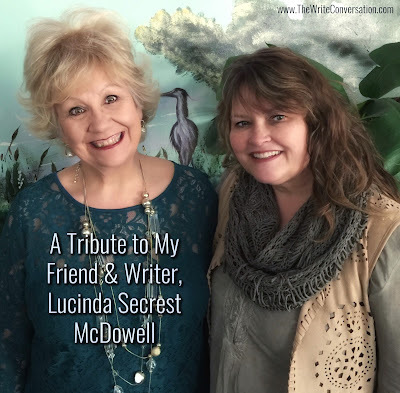
By Edie Melson @EdieMelson
Today is the third Tuesday of the month and the regular day for our columnist, Lucinda Secrest McDowell. Instead, I’m offering this tribute in her memory.
As many of you know, our precious friend, Lucinda Secrest McDowell has moved to her eternal home in Heaven. Her earthly battle with cancer has ended and now, instead of her constant encouragement, we find ourselves mining our memories for her wisdom.
Cindy was my friend, my prayer warrior, and so often—my inspiration on how to live out this calling to write. Words will never be enough to honor her, but we’re word people and words are where we turn—in good times and in difficult one.
I met Cindy at the Florida Christian Writers Conference (thank you, Eva Marie Everson). She was my assigned roommate and a true gift from God. During that conference, a crisis in my life appeared and Cindy was heaven-sent to pray for me and with me. Our friendship was cemented during that difficult time.
That is the heart of Lucinda Secrest McDowell. If I had to describe her, it would be with equal parts prayer warrior and encourager. Her strength and ability for both flowed naturally from the deep relationship she had with Jesus. Her love of God was instantly visible no matter what she did.
Here are some of the things I’ve learned from her—presented through links to her previous posts. Her posts will stay here on The Write Conversation and my hope is that she will continue to encourage writers for many years to come.
Blog Posts from Lucinda Secrest McDowell
It’s Okay for Writers to Lament
Staying S.T.R.O.N.G. as a Writer
Watch Your Words
Writing About Painful Times
When You Wonder if Your Writing Even Matters…
How to Write a Blessing
Can One Writing Assignment Change the World?
Use These 5 Ways to Encourage Other Writers
Remembering a Writer’s Harvest
Cindy was a wordsmith dedicated to honoring God through her craft. Let’s honor her by taking up the mantle of writer with renewed purpose and determination.
Blessings,Edie
TWEEETABLEA Tribute to My Friend & Writer, Lucinda Secrest McDowell on @EdieMelson (Click to Tweet)
 Edie Melson is a woman of faith with ink-stained fingers observing life through her camera lens. She’s a writer who feels lost without that device & an unexpected speaker who loves to encourage an audience. She also embraces the ultimate contradiction of being an organized creative. She knows the necessity of Soul Care and leads retreats, conferences & workshops around the world on staying connected to God. Her numerous books, including the award-winning Soul Care series & reflect her passion to help others develop the strength of their God-given gifts. Her blog, The Write Conversation is recognized as one of the top 101 industry resources.
Edie Melson is a woman of faith with ink-stained fingers observing life through her camera lens. She’s a writer who feels lost without that device & an unexpected speaker who loves to encourage an audience. She also embraces the ultimate contradiction of being an organized creative. She knows the necessity of Soul Care and leads retreats, conferences & workshops around the world on staying connected to God. Her numerous books, including the award-winning Soul Care series & reflect her passion to help others develop the strength of their God-given gifts. Her blog, The Write Conversation is recognized as one of the top 101 industry resources. She and husband Kirk have been married 40+ years and raised three sons. They live in the foothills of the Blue Ridge Mountains and can often be found hiking—with Edie clinging to the edge of a precipice for the perfect camera angle and Kirk patiently carrying her camera bag and tripod. Connect with her on her website, www.EdieMelson.com and through social media.
Published on April 17, 2023 22:00
April 16, 2023
Tips and Results for Writers After Experimenting with Marketing

by Karen Whiting @KarenHWhiting
In marketing, we experiment to see what sticks. I do that too. I grew my Pinterest views from less than 2k monthly views in December to 5k in February. I focused on it more in March and by early April it climbed to more than 18k monthly views.
I also decided to do a bit more social cross sharing. So I have shared articles to Pinterest, pins to Facebook, and Facebook posts to Instagram. It’s good to see what works best for you, but that also means having a strategy. Like have a hypothesis in a science experiment, we consider what the outcome might be and what steps to take in our marketing experiment. Here are some thoughts and a few results I noticed in a few social medias.
Scheduling Posts in FacebookI can schedule a few months of posts at a time in Facebook. I can usually manage 30 at a sitting and can also have them post on Instagram. I tend to get more comments on Instagram but usually from male scammers that I block. The few on FB are better. However, I keep scheduling as it has grown one of my pages a lot and I hope it will impact the other page at some point. There’s a theory that you can reach a tipping point where things move in your favor and I saw that on my author page.
You can also repeat posts from past schedules. If you are growing followers and don’t have many that tends to be fine. If your followers are getting engaged they will want new posts from what I have found.
Other Facebook NotesI do best when I do live videos. As it seems to inspire much more engagement. Other popular engagement posts flow from sharing something personal or an anecdotal story.
I notice friends who get great engagement often promote their friends’ books. It is such a generous thing to do if you have the books and time. I did that in December as a special event to promote peace books. For us who they might feature, this is a borrowed platform.
When I started posting book news to my author page and sharing the posts so FB would not penalize me ad type posts on my profile, my author page started growing at a slow steady rate.
A friend shared how she did a daily Facebook ad to grow her page and in a few months had more than 20k followers plus good engagement. I did a simple Facebook ad to recently to grow my likes on a page and it has been growing steadily.
Pinterest ExperimentsIt’s better to use original photos than copies. I have tons of photos and quite a few videos However that takes more time and I noticed a friend who had great growth used a combination of posting photos from others as well as original pins. I created my own pins to go from 2k to close to 18k in 2a little over 3 months, but now started adding in re-pins so I can populate boards faster. To keep the numbers up., it means to continue posting and developing a strategy of what to post.
I started pinning a few times a week, but now pin a few daily. If I start slipping in views I can bring it back up in two days of adding several pins. My most popular pins include ones that link to my articles, plus craft and cooking videos In the past few days I added hashtags and that also increases the views. Pinterest also puts up a list of trends that can provide ideas of what to pin.
I track the audience through the analytics and find I am close to my target audience of moms of young children with a secondary audience of grandmas My boards reflect the audience with board for motherhood, crafts, kid activities, and family boards.
Friends' Experiments
TikTokSharon Elliott started experimenting with TikTok a few months ago with simply putting up a quote a day set to music and a little animation.. She found this an easy way to grow a following and reached more than 4k likes in a few months. Consistency always helps.
LinkedInVideo content is great for promotion and the most popular content on LinkedIn. But it needs to be professional.. I get my best FB results when I do a FB live video and then post it in other social media. But what’s surprising is how popular video is on LinkedIn. According to marketing gurus it’s the second most popular place to use videos, right after YouTube.
Experimenting Tips for Writers & MarketingDevelop a strategy and then test it:Allow a few months for testing and observing results.Note likes, views, and engagement responses as well as any purchases if you link to sales.Boost engagement by responding to legitimate comments (not the opposite sex saying you look enticing). Plan for a variety of posts from very simple ones to carousels and videos. Try live videos if the platform includes that option.Cross promote by sharing popular posts to other social media.Check the analytics to track the audience and see if you come close to your target audience. Be strategic in creating posts or boards of interest to your audience.After your set months end, decide if it is worth continuing or not.Have fun and let me know how your experiments work.
TWEETABLETips and Results for Writers After Experimenting with Marketing from author @KarenHWhiting on @EdieMelson (Click to Tweet)
 Karen Whiting (WWW.KARENWHITING.COM) is an international speaker, former television host of Puppets on Parade, certified writing and marketing coach, and award-winning author of twenty-seven books for women, children, and families. Her newest book, The Gift of Bread: Recipes for the Heart and the Table reflects her passion for bread and growing up helping at her grandparent’s restaurant. Check out her newest book Growing a Mother’s Heart: Devotions of Faith, Hope, and Love from Mothers Past, Present, and Future. It's full of heartwarming and teary-eyed stories of moms.
Karen Whiting (WWW.KARENWHITING.COM) is an international speaker, former television host of Puppets on Parade, certified writing and marketing coach, and award-winning author of twenty-seven books for women, children, and families. Her newest book, The Gift of Bread: Recipes for the Heart and the Table reflects her passion for bread and growing up helping at her grandparent’s restaurant. Check out her newest book Growing a Mother’s Heart: Devotions of Faith, Hope, and Love from Mothers Past, Present, and Future. It's full of heartwarming and teary-eyed stories of moms.Karen has a heart to grow tomorrow’s wholesome families today. She has written more than eight hundred articles for more than sixty publications and loves to let creativity splash over the pages of what she writes. She writes for Crosswalk. Connect with Karen on Twitter @KarenHWhiting Pinterest KarenWhiting FB KarenHWhiting.
Published on April 16, 2023 22:00



